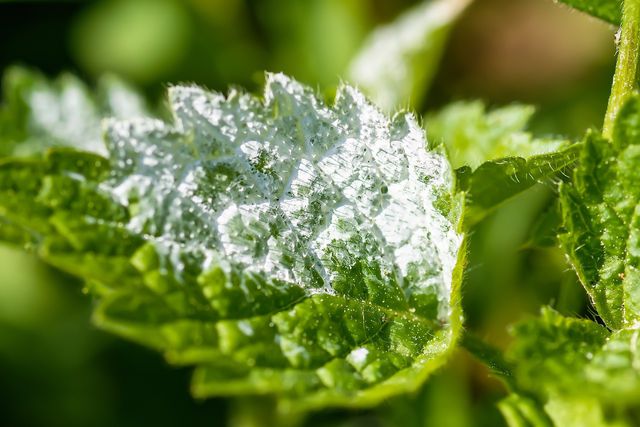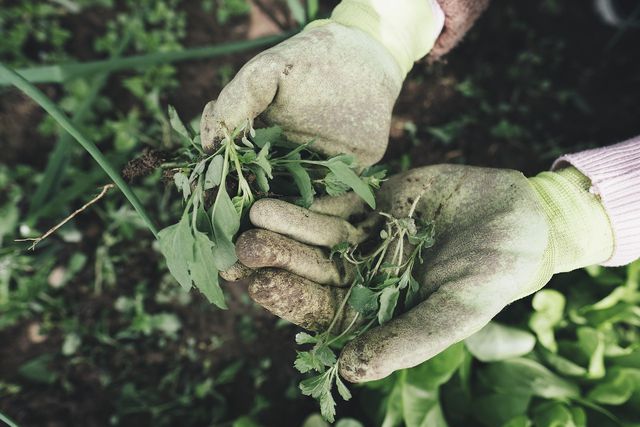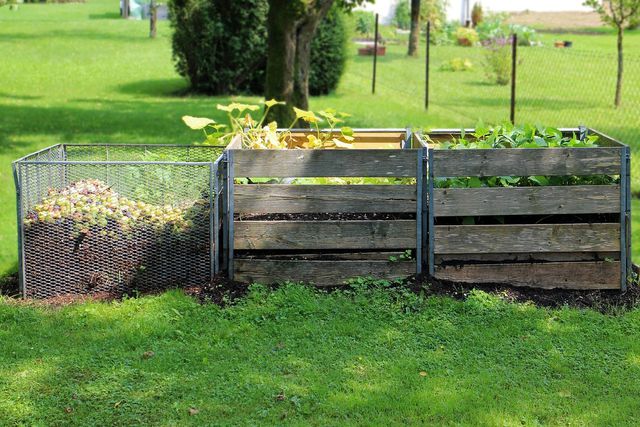Among other things, baking soda can fight various pests and diseases in the garden – without any synthetic additives. We present some of the possible applications in more detail.
You can find numerous chemical aids against weeds and pests in the hardware store. However, these are usually not only expensive, but also very problematic from an ecological point of view. The poisons they often contain not only fight weeds or pests, but also harm surrounding plants or passing insects.
Natron as a home remedy is natural and inexpensive, and is effective against aphids, mildew and weeds, among other things. In addition, you can use sodium bicarbonate to find out if your soil is too acidic and you can increase the ph of the soil. Sodium bicarbonate also helps against unpleasant odors in the garden.
Contents
1 baking soda in the garden: against aphids
Aphids often attack garden plants, especially in spring. Then the small insects form a sticky film or a black mold coating on the leaves of your plant. This not only looks unsightly, it weakens your plants and makes them more susceptible to disease.
If you use baking soda in your garden, you can control aphids:
Dissolve two teaspoons of baking soda in a quart of water.
Pour the mixture into a spray bottle and spray the top and bottom of the infested leaves well.
You can add a teaspoon of cooking oil to the mixture. This way the solution will stick well to the plant even on rainy days.
If you want to fight mealybugs and scale insects with sodium bicarbonate, you can use the same solution and add a dash of methylated spirit at the end. However, you should not do this on herb, fruit or vegetable plants intended for consumption, but only on ornamental plants.
2 sodium bicarbonate against mildew

Powdery mildew is a generic term for various plant diseases caused by fungi. You can recognize fungal infestation by white spots on the leaves. In the case of downy mildew, on the other hand, only yellowish, light spots appear on the upper side of the leaf. In both cases, the disease severely weakens your plants and, in the worst case, can cause them to die completely.
If you have discovered mildew, you should therefore act quickly. To do this, you should first remove all parts of the plant that show clear traces of the disease. To prevent the fungi from spreading further, you can use baking soda:
Mix two teaspoons of baking soda with one liter of water.
Spray a large area of the plant with the solution.
Repeat the process several times until the disease is completely gone.
How you can get rid of mildew in other ways, you can learn here: How to fight powdery mildew: These home remedies will help your plants.
3 soda in the garden: against weeds

Unwanted wild plants that interfere with the growth of your garden plants can, of course, be removed with the appropriate tools. However, sodium bicarbonate eliminates the need for weeding in the garden and saves you a lot of time. You will need a sodium bicarbonate solution for this as well:
- Bring a liter of water to a boil.
- Mix the boiling water with a tablespoon of baking soda.
- Let the mixture cool down.
- Pour the solution into a spray bottle and spray weeds thoroughly with it at least once a day. After a few days, the unwanted plants should be dead.
When spraying, make sure that your other garden plants do not get any of the solution and keep a sufficiently large distance from them.
By the way, many plants that we dismiss as “weeds” don’t deserve to be fought so vehemently. Dandelion, wild garlic or stinging nettle, for example, we can use as spicy food. You can learn more about them here: 10 alleged weeds you can eat.
4 soda in the garden: for healthy soils
You want to find out if your soil is too acidic? You can also use sodium bicarbonate in the garden cheaply and quickly:
- Pour the appropriate part of the soil with a little water.
- Now sprinkle the baking soda on the spot.
- If small bubbles form, this is an indication of acidic soil.
- If nothing happens, the ph value of the substrate is above five.
In acidic soils, the basic soda reacts with the acid in the substrate. This is what causes the bubbles to form. Sodium bicarbonate raises the ph and, at least in moderation, can balance acidic soil or provide basic (alkaline) soil that provides sufficient nutrients:
Add one to two tablespoons of baking soda to the irrigation water.
Water the appropriate plants with the sodium bicarbonate solution.
Note: To ensure a higher pH value over a large area, lime is more recommended than sodium bicarbonate. This is significantly less expensive.
5 baking soda against unpleasant odors in the garden

Is there always a musty smell wafting through your garden from the compost heap? Sodium bicarbonate can also help you. The household remedy neutralizes odors and is therefore also suitable for cleaning in the apartment.
In the garden, you can simply sprinkle baking soda directly onto the compost pile or the respective source of the unpleasant odor. If this is not possible, you can put baking soda mixed with a little water in a small bowl near the source of the odor. Alternatively, you can fill the soda solution into a spray bottle and spray it, for example, in the garden shed.

